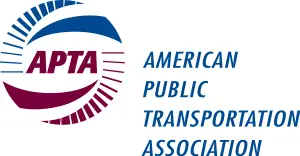APTA: American Public Transportation Association

APTA, the American Public Transportation Association, was founded in 1882. It is an international organization that serves the public interest by providing safe, efficient, and economical transit services, and by improving those services to meet national energy, environmental, and financial concerns. APTA serves over 90% of passengers using transit in the U.S. and Canada. APTA members are public organizations engaged in the areas of bus, paratransit, light rail, commuter rail, subways, waterborne passenger services, and high-speed rail. Standards from APTA are available both individually, directly through the ANSI webstore, and as part of a Standards Subscription. If you or your organization are interested in easy, managed, online access to standards that can be shared, a Standards Subscription may be what you need - please contact us at: [email protected] or 1-212-642-4980 or Request Proposal Price.
Below are APTA's best-selling standards. To find additional standards, please use the search bar above.
APTA RT-VIM-S-017-03 Rev. 2 [2015]
Calibration of Inspection Maintenance Precision Measuring Devices and Tools
This Standard covers basic procedures for calibration of inspection and maintenance precision measuring devices and tools.
APTA-PR-IM-RP-002-98 [2004]
Recommended Practice for Rail Car Technical Documentation
This document defines a development process and organizational details to be used as a model to procure railcar technical documentation. This document details the requirements for operations and maintenance manuals and illustrated parts catalogs to achieve maximum utility and on-the-job practicality.
APTA-PR-CS-S-012-02 [2004]
Standard for Door Systems for New and Rebuilt Passenger Cars
This standard contains the minimum requirements for door systems and door system operation on new and rebuilt rail passenger cars.
APTA-PR-PS-S-004-99 Rev 2 [2007]
Standard for Low-Location Exit Path Marking
This standard contains minimum requirements for an emergency low-location exit path marking system (LLEPM) for all passenger rail cars using passive (non-electrically powered illumination) and/or active (electrically powered illumination) means of marking the exit path(s) to safety.
APTA-RT-FS-S-003-02 [2004]
Standard for Station, Shop and Yard Inspection and Maintenance
This standard provides general requirements for periodic inspection of safety critical components of rail transit stations, shops and yards. The standard covers what inspections and maintenance shall include together with a general range of frequency for such inspections and maintenance and the qualifications of rail transit employees or contractors that perform these procedures. The standard provides both a rating system for safety critical components and record keeping requirements.
APTA-PR-E-S-010-98 [2004]
Standard for the Development of an Electromagnetic Compatibility Plan
This standard defines the requirements for an Electromagnetic Compatibility (EMC) Program for all rail equipment and track sided equipment delivered to the railroad to achieve safe operations. This Standard includes a requirement for an Electromagnetic Compatibility Control Plan (EMCCP), defines the classes of Electromagnetic Interference and Hazards, defines the minimum requirements of an Electromagnetic Compatibility Test Plan, Electromagnetic Compatibility Test Procedure and an Electromagnetic Compatibility Test Report.
APTA-RT-OP-S-004-03 [2004]
Standard for Work Zone Safety
This standard provides guidance for the development of Rail Transit System RTS work zone safety rules and procedures and provides suggested approaches for developing said rules and procedures





